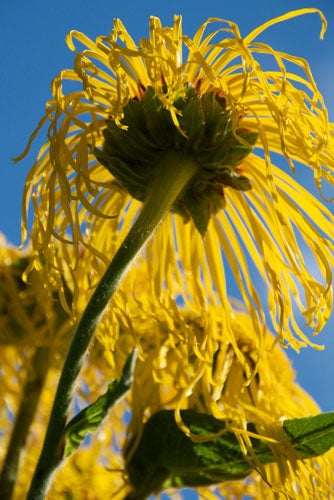Urban Gardener: Crazy daisies

On wanting to introduce some daisy-action to a client's garden recently, I was told in no uncertain terms: "OK, but no yellow, thank you very much." It's not often that I'll get a client barring a specific colour from a plant list, but when I do it will almost always be yellow or orange. The reasons for not liking a specific colour are about as clear as why some people are frightened of spiders except, of course, that yellow flowers don't scuttle across the carpet, make webs, or bite. OK, bad analogy.
My thinking is that so much emphasis is placed on the pastel shades – purples and blues – during the Chelsea Flower Show that good taste has got the better of some people and a fresh, clear yellow is seen as too obvious, or even vulgar. But a yellow daisy is about as cheery as it gets. Any child asked to draw a flower will, nine times out of 10, produce a daisy. Daisies are therefore embedded deep in our psyche as a symbol of happiness. Not to like them means you are almost certainly destined for a career in IT.
There may be echinacea, aster and the ubiquitous, but utterly delightful, Erigeron karvinskianus (its haze of pink-tinged white petals cleverly distracting a yellow centre) to play with, but I'd quite fancied using Inula magnifica 'Sonnenstrahl' to add a touch of perennial drama to a medium-sized garden where some exotic planting scheme needs a bit of a re-think. I may be guilty of wanting to make up for my own shortcomings and inadequacies in my own garden where yellow daisies have struggled this year. Telekia speciosa once occupied pride of place at the back of the garden, but snails eventually got the better of it and the only nod to a sunny face in the garden now is Euryops pectinatus which I bought after seeing it in Barbara Hepworth's garden in St Ives. It's an obliging, silver-leafed plant for a container in an urban garden. Its sporadic flowering this year has earned it the moniker "Cyclops", suggesting that it needs repotting but probably shows that it simply hasn't had enough sun this year.
Anyway, back to the inula. To sell the idea, I will have to big it up. Not that it needs it. The name should be a clue as to the statement this plant will make. Plain magnifica stands big enough at 2m, but 'Sonnenstrahl', with huge lush leaves, will extend to almost 3m before producing clear-yellow, spidery (I told you it was a bad analogy) flowers. From a distance they are stonking. Walking among them is like looking up at daisies in the old TV series Land of the Giants – you'll have one eye out for a moggy the size of a house. The plant has many medicinal qualities (and was used as a potherb by the Romans, although the leaves are too bitter for today's refined palettes) but looking up at dazzling yellow daisies against a brilliant blue sky is therapy enough. They are happy in most soils provided it doesn't dry out, which makes them an obvious choice for waterside planting schemes. There is a raised pond in the garden I want to use them in, but I'm hoping to enrich the soil and use them to punctuate some evergreen exotica (chamaerops, eriobotrya, bamboo) and avoid having to use cannas which don't really do it for me or (thankfully) the client.
Like my ill-fated telekia, inulas are susceptible to slugs in their first year although once they have established a good foothold their rate of growth in spring should be able to outpace anything and will even naturalise in grass. If you fancy some yellow in your life but really haven't the space or the nerve for such drama then look out for the smaller (75cm) Inula hookeri, a plant that immediately jumps into my top 10 every time I see it. Many will try to put you off because of the plant's invasive tendencies, but in my view, such people are gardening wimps! Watching the mutation from bud to flower amid a gossamer-furry haze is about as beautiful and absorbing as it gets in the garden.
Subscribe to Independent Premium to bookmark this article
Want to bookmark your favourite articles and stories to read or reference later? Start your Independent Premium subscription today.

Join our commenting forum
Join thought-provoking conversations, follow other Independent readers and see their replies